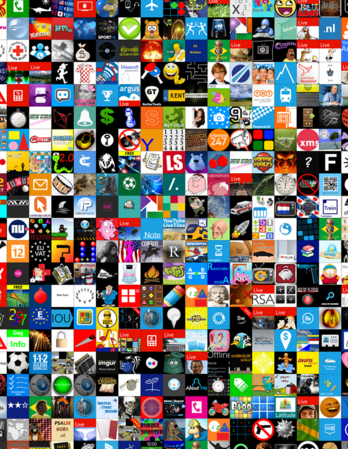Find out the week’s top mobile stories from around the world.
This week…Google reverses Samsung ad-blockers decision, Opera gets offered out for $1.2bn, Twitter users numbers are flatlining, India says ‘no’ to Facebook’s Free Basics and much more.

Google reverses decision on Samsung ad blockers
Mobile Marketing Magazine
Google appears to have reversed its earlier decision to ban ad blockers from its Google Play Store, restoring Adblock Fast, the app that partnered with Samsung for the launch of its new ad block-friendly browser.
At the start of last week, Samsung launched a new version of its own mobile browser that supported content and ad blocking plug-ins, bringing the option to eliminate ads in a default browser to a large number of Android users for the first time. AdBlock Fast partnered with Samsung for the release, although the company also made the API available to other developers.
Read more…
Opera receives buyout offer from Chinese consortium for $1.2 billion
Android Central
Opera Software, the company behind the popular mobile browser, has received a buyout offer from a consortium of Chinese companies for NOK 10.5 billion ($1.2 billion). The consortium consists of mobile game developer Kunlun and mobile security maker Qihoo, and is backed by investment funds Golden Brick and Yonglian.
The deal opens up Opera to a wider userbase in China, while giving Kunlun and Qihoo access to Opera’s mobile advertising platform.
Read more…
Mobile loyalty cards to double over five years
Retail Systems
More than three billion loyalty cards will operate as mobile-only or be integrated into apps by 2020, up from 1.4 billion last year, according to Juniper Research.
It says that brands and retailers are increasingly offering customers the opportunity to store their loyalty cards within a dedicated digital wallet. And the improved targeting and personalisation that comes of this is leading to greater activity rates.
Read more…
Twitter reports 320 million users in Q4 2015, flat for the first time and down when excluding SMS
VentureBeat
Twitter’s user growth just hit a wall.
In its fourth quarter 2015 earnings announcement today, Twitter revealed it now has 320 million monthly active users (up 9 percent year over year). But that’s not the full story. On a sequential basis, Twitter didn’t add any monthly active users — the company reported 320 million monthly active users in Q3 2015 as well.
Analysts had expected Twitter to report 325 million monthly users, or a 1.5 percent sequential growth. Instead, Twitter grew its total user base 0 percent sequentially. Mobile monthly active users represented approximately 80 percent of the total figure, a number that has been flat since Q3 2014.
Read more…
Google releasing virtual reality headset this year, report says
Mashable
Back in January, we reported that recent job postings indicating that Google was likely developing its own virtual reality headset.
Now, just two weeks later, a new report claims to have confirmation that Google isn’t just working on a VR headset, but that the headset will debut sometime this year.
Citing a source “familiar with [Google’s] plans” the report from the Financial Times on Sunday asserts that (as we guessed last month) the headset will be a competitor to Samsung’s Gear VR. Along those lines, the device will need to be paired with a smartphone in order to operate.
Read more…
India bans Facebook’s Free Basics
Techinasia
The Telecom Regulatory Authority of India (TRAI) today ruled in favor of net neutrality,explaining that no service provider should have the right to charge different prices for data services based on content.
While the latest release isn’t only directed at Facebook, Mark Zuckerberg’s aggressive attempt at providing what he calls “free internet” to India has definitely gotten the TRAI to work a little faster.
The TRAI will charge US$735 for each day that a service provider goes against the ruling. This fine will be implemented after six months, and the newly passed regulation will be reviewed after two years.
Read more…
Pakistan leads South Asia in mobile money
The Express Tribune
Pakistan is leading its way in South Asia with nine per cent of its male and two per cent of its female citizens using mobile phones to carry out financial transactions, a recent World Bank report has claimed.
The study conducted by World Bank’s Global Findex Database, which provides in-depth data on how individuals save, borrow, make payments and manage risks, revealed that an average three per cent of people in South Asia used a mobile phone to send or receive money in 2014.
Read more…
Visa’s open APIs signal battle against Silicon Valley payment platforms
Mobile Commerce Daily
Visa’s new developer platform, which offers third-party companies the ability to sift through hundreds of commerce-related APIs, indicates the brand’s desire to one-up its competitors in the mobile payments space by creating a massive network of partnerships.
Visa Developer is meant to revamp the brand’s retail payments network into an open platform with the ability to fuel innovation in commerce, specifically by giving software application developers access to proprietary technology. As Visa Checkout experiences continuous adoption by top merchants, the payments company is planning to bring its net of 150 commerce-related APIs to third-party providers and developers, a strategy that could be a hit in Silicon Valley.
Read more…
Cheap smartphones to propel app spending past $100 billion
Bloomberg
Worldwide mobile application store revenue is set to reach $101 billion in five years as smartphones become cheaper and data plans more accessible, drawing in people in developing countries, according to data provider App Annie.
The user base of smartphones and tablets will more than double to 6.2 billion by 2020, up from 2.6 billion, the San Francisco-based company said in a forecast today. Some of the strongest growth will come from countries such as India, Indonesia, China, Mexico, Brazil and Turkey. Revenue generated per device will grow to $16.2 in 2020 from $15.4, boosted by spending in the Americas, Europe and the Middle East, even as average revenue will decline slightly in the fast-growing Asia-Pacific region.
Read more…
Smart watches top wearable wish lists in Latin America
eMarketer
According to Qualcomm Innovation Society Index (QuISI) research conducted by International Data Corp. (IDC), internet users in Argentina, Brazil, Colombia and Mexico are more likely to say they want a smart watch than any other wearable device.
Smart watches were most desired in Mexico, where 71% of internet users wanted one. Smart watches also had the biggest lead over other options in Mexico, where just 28% of respondents wanted a fitness band.
Fitness bands were the No. 2 desired device in all four markets, with a high of 40% of internet users in Argentina suggesting they wanted one—still significantly lower than the 59% in the same country who wanted a smart watch.














